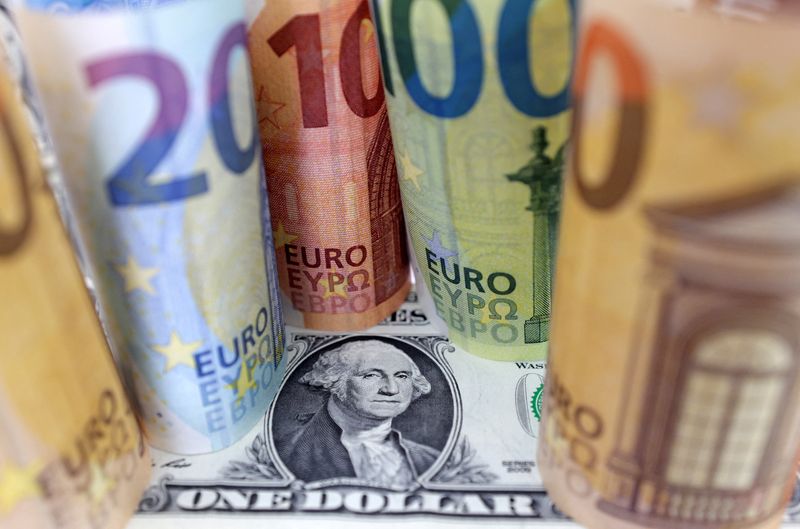By Saqib Iqbal Ahmed
NEW YORK (Reuters) -The dollar fell against the euro on Tuesday after retail sales data showed signs of exhaustion among U.S. consumers, strengthening the case for interest rate cuts by the Federal Reserve later this year.
U.S. retail sales rose less than expected in May as lower gasoline and motor vehicle prices weighed on revenues at gas stations and car dealerships.
The sales growth trend is slowing as higher prices and interest rates force households to prioritize essentials and cut back on discretionary spending.
“It may have come later than initially expected, but the tight financial conditions created by the Fed appear to finally be putting pressure on household budgets this year,” said Stuart Cole, chief economist at Equiti Capital.
“But a softer pace of consumption could actually be welcomed by the Fed as it makes the task of returning the CPI to target much easier, especially given the key role domestic consumption plays in boosting US economic activity.” , said Cole.
The euro traded 0.02% higher at $1.073625. The common currency fell to $1.071 earlier in the session.
Against a basket of currencies, the dollar was roughly flat at 105.30.
“The softer-than-expected retail sales report increases the likelihood that the Fed will cut rates within a few months,” Bill Adams, chief economist at Comerica (NYSE:) Bank, said in a note.
Fed funds futures implied a 67% probability of at least one rate cut at the September Fed meeting, up from 63% a day ago.
Philadelphia Fed President Patrick Harker said Monday he supports just one rate cut this year, but left the door open to change his position depending on incoming data.
A long list of Fed officials will take the stage later in the day at various locations, including Susan Collins of the Boston Fed and Thomas Barkin of the Richmond Fed.
Last week, dovish U.S. inflation data contrasted with the overall hawkish stance of Fed officials, who cut their previous median projection for a three-quarter-point rate cut this year to one.
Last week’s dollar rally was largely driven by a sharp sell-off in the euro after French President Emmanuel Macron called a shock election in response to Marine Le Pen’s Eurosceptic National Rally defeating his ruling centrist party in the elections for the European Parliament.
The euro has stabilized since then.
“This weekend, France’s Le Pen said she would be willing to work with President Macron and would not visit him,” said Mohit Kumar, chief European economist at Jefferies.
“Some of the recent de-risking has been driven by fears of a ‘Frexit’ and the break-up of the eurozone,” he said. “Those fears are exaggerated.”
The dollar was little changed against the yen at 157.81 yen, holding below Friday’s six-week high of 158.26.
Sterling was flat at $1.2705 on the day as investors awaited Wednesday’s inflation figures and the Bank of England’s interest rate decision the day after.

Meanwhile, the dollar was 0.6% higher after the Reserve Bank of Australia kept interest rates steady on Tuesday. “The RBA’s position was well telegraphed: they are waiting until they get more inflation data,” NAB’s Catril said.
In cryptocurrencies, bitcoin fell about 3% to $64,475, a one-month low.


